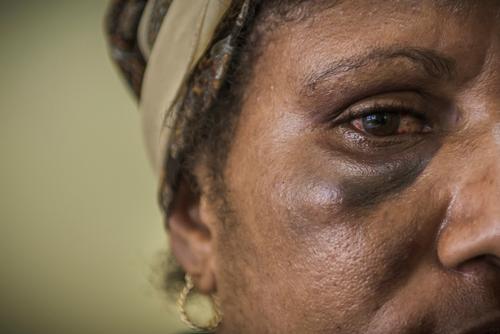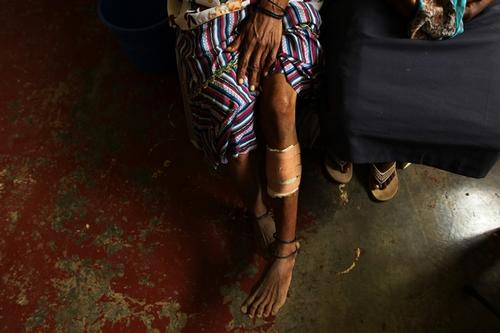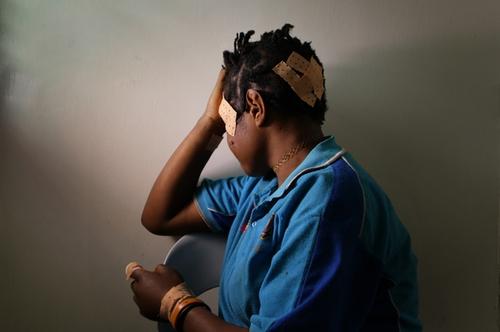Letter from Papua New Guinea
“In the end I leave with hope… hope that violence becomes the exception to the rule and not the rule itself.”
Kate White is a nurse from Brisbane, Australia who has done six field placements with Médecins Sans Frontières.
I am currently working in Tari in the Southern Highlands of Papua New Guinea. Tari is one of the most beautiful places I have ever been. All around the town are mountains covered with trees. In the morning the cloud rolls into the valley and you can see the tops of the mountains poking through. It is so beautiful it is almost magical.
On a Saturday night towards the end of my mission, one of our logisticians asks me what my top moments in Tari have been. I think about all the experiences I have had as medical team leader, and come up with two moments that had a real impact.
“It is seen as a woman’s fault”
The first was a patient that we received in our Family Support Centre, which offers integrated care to survivors of family and sexual violence. Basically we provide a one-stop shop where people can access both medical and psychosocial care for the injuries they have sustained from violence.
The patient was a woman in her late 30s, not that much older than me, who had been walking home from the market when a man grabbed her, dragged her into bushes, threatened her with a knife and raped her. She came to us as she was very scared about getting pregnant from the rape. She was a single mother of three and could not afford to have another child. She lived in the compound of her husband’s family even though it had been many years since she had seen him. But if they found out that she had been raped they would throw her out. In Tari it is seen as a woman’s fault if she is raped.
The most disturbing part was that this was the fourth time in her short life that she had been raped. Yet her level of trauma appeared quite low. In fact one of her biggest concerns was that I was too skinny and needed to be fed. She offered to give me veggies from her garden to fatten me up. We provided her with drugs to prevent HIV and other STIs, emergency contraception to prevent pregnancy, vaccinations to prevent tetanus and Hepatitis B as well as psychosocial support. Three days later she returned to give me the vegetables and some seeds so that I could grow my own. She made me want to cry: she had gone through an incredibly awful experience yet all she could do was think of others.
Accidental stabbing
The second moment was a patient who became much closer to my heart than I would normally allow. His name was Will. I received a call from a company in the area to say that a child had walked into their clinic with a penetrating wound to his abdomen. He was stable but needed urgent surgery and they were organizing a helicopter to bring him to Tari if we would accept him.
In addition to running the Family Support Centre, Médecins Sans Frontières also provides emergency and trauma surgery to the people of Tari and Hela province, so I immediately said yes.
The surgeon and I went to the airport and finally the helicopter landed to reveal a scared looking seven year old. I picked him up and carried him to our car and he stared at me with his big brown eyes. I remember thinking that he had the most incredible eyelashes. At the hospital, we removed his dressing to reveal that his bowel was on the outside. He was taken straight to the operating theatre.
While the rest of the team was operating I tried to discover what had happened. It turned out that Will and his older sibling had been playing and he was accidently stabbed. I was not surprised because unfortunately this is an all too familiar story in Tari.
As Will recovered we built quite a rapport. The staff seemed to think it was because I was the first person he saw after he came off the helicopter; I like to think it is because I am a naturally likeable person, but we will never really know the truth. After ward rounds I would take him out in a wheelchair to ‘harass’ other people. We would create water guns out of syringes and target passers by. By the time he left the hospital, 10 days later, he was back to his old mischievous self.
Violence should not be ‘normal’
Writing this letter I had to confront the fact that what I have been seeing should not be normal. Yet during the nine months that I have been in Tari it has become that, completely normal. Violence in all forms, including sexual violence, has become normalised for the population here. But there are many people trying to change this. Not only is Médecins Sans Frontières working hard to create awareness and change but individuals are setting up safe houses for women and children affected by family and sexual violence. And gradually we see the attitude of our own local staff and patients changing.
In the end I leave with hope. Hope that more of the community will want and accept change. Hope that violence becomes the exception to the rule and not the rule itself. Hope that one day the beauty of Tari lies not only within the landscape but also with a community that has changed their society for the better.





